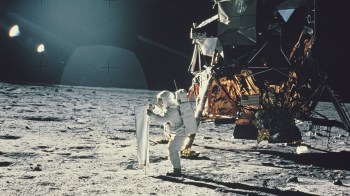Playing matchmaker in Silicon Valley
Online dating is a billion dollar industry, and one in three Americans met their match through websites or dating apps. But algorithms don’t always work for everyone, even in Silicon Valley.
Michael Ralston is a software designer and a client of Linx Dating, a boutique matchmaking service in Palo Alto. There’s a lot that he likes about online dating — the time to craft thoughtful responses, multitasking while chatting with someone — but he wasn’t having much luck.
So he tried Linx.
When Ralston joined the matchmaking service his wardrobe was the typical Silicon Valley uniform: jeans and T-shirts. Amy Andersen and Michael Norman of Linx dating took him shopping, got him a haircut and figured out what Michael needed to become more dateable. It is full service, top to bottom.
“Dinner reservations and recommendations, sedan booking should they not want to drive for the date,” Andersen lists some of Linx’s many services. “Shopping for some proper hand towels, making sure the refrigerator is stocked with some decent wine.” Andersen takes clients ballroom dancing to work on rhythm and letting go.
Linx counter-intuitively brings “Fiddler on the Roof”-style matchmaking to the most connected Valley in the world, but business is booming. Andersen charges up to $100,000 for tailored matchmaking services.
Andersen hit on the idea for Linx one night during a dinner date. She is a strikingly beautiful and charming Stanford grad, yet her date kept looking over her shoulder.
“So I called him on it,” she says. “I said, ‘What are you doing?’ and he literally said ‘The BBD’. And I said ‘The whatah, whatah, huh?’ and he said ‘the Bigger Better Deal.’”
The “Bigger, Better Deal” is a Silicon Valley anxiety disorder in-which one can’t stop searching for the next hot start-up. Andersen realized that the sheer number of singles online creates a kind of dating BBD.
“The grass is always greener,” Andersen says, “there has to be someone else who’s just a little more interesting, or a little more of a better match.”
A third of Americans agree that online dating’s masses make it hard to pick just one. But if you do win the electronic love lottery, studies show online couples have higher satisfaction and lower divorce rates. So Linx offers a blend—a large enough pool to find deep matches, but not so many that clients get stuck in choice paralysis. Andersen also works with each client individually, zeroing in on their romantic pitfalls.
Her client Michael Ralston is smart, interesting and very sweet, but his weaknesses are confidence and real time communication with women. So Andersen gently hammers away at these challenges.
She runs Ralston through a mock version of the pre-date phone call.
“Ring,” Ralston says, holding his hand like a phone to his ear.
“Hello?,” Andersen replies.
“Hi Amy, this is Michael…. Amy from Linx gave me your number.”
“Oh hi Michael! How was your workday?”
“Um, pretty good. So…” Ralston stumbles, blushing.
“Tell me about it, tell me about your workday,” Andersen says.
Ralston gives up and breaks down laughing.
Andersen drops character and says, “What were you feeling right then when I said, ‘How was your day?’”
“I was like “Oh no!” to be honest,” Ralston says.
They practice the call several times until Ralston is able to go off script and be more spontaneous.
Life lessons, wardrobe make-overs, mock dates. All this costs Ralston over ten grand. But does he think it’s worth the price?
“I’ve always been socially awkward and I think I’m less so now,” he says. “It is expensive. But from one point of view, the answer to that question is—is it going to work?”
High-end matchmakers often say they successfully match up eighty to ninety percent of their clients. But what successful match means is harder to pin down.
There’s a lot happening in the world. Through it all, Marketplace is here for you.
You rely on Marketplace to break down the world’s events and tell you how it affects you in a fact-based, approachable way. We rely on your financial support to keep making that possible.
Your donation today powers the independent journalism that you rely on. For just $5/month, you can help sustain Marketplace so we can keep reporting on the things that matter to you.


















